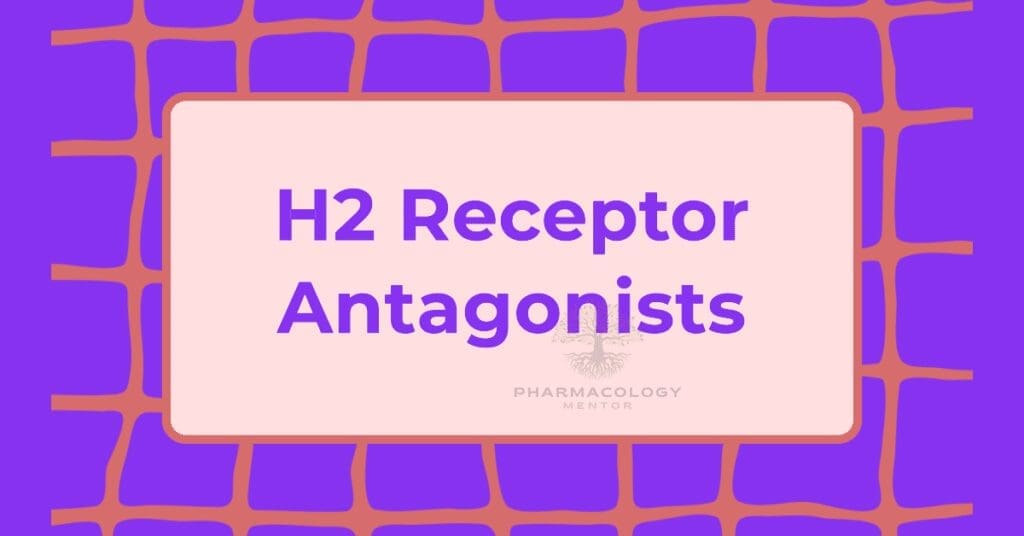Histamine H2 receptor antagonists are competitive blockers of gastric parietal-cell H2 receptors that suppress basal and stimulated acid secretion and are used for GERD, peptic ulcer disease, hypersecretory states, and selected prophylaxis indications, with famotidine preferred clinically because of potency and safety while ranitidine has been withdrawn for NDMA contamination concerns. The class reduces nocturnal and meal-stimulated acid via inhibition of the histamine–cAMP–PKA pathway that mobilizes the H+/K+ ATPase, with rapid onset of action but susceptibility to tachyphylaxis during chronic use in some settings.
Core definition
H2 receptor antagonists (H2RAs) are acid-suppressing agents that reversibly and competitively inhibit histamine binding at H2 receptors on gastric parietal cells to reduce hydrogen ion secretion into the gastric lumen. Clinically used members include famotidine and cimetidine in current practice, while ranitidine has been removed from the U.S. market and nizatidine has faced recalls related to nitrosamine impurities in certain products.
Acid physiology
Gastric acid secretion is controlled by neural acetylcholine, endocrine gastrin, and paracrine histamine inputs that converge on the parietal cell to activate the apical H+/K+ ATPase proton pump. Histamine from gastric enterochromaffin‑like cells binds H2 receptors, activates adenylate cyclase, raises intracellular cAMP, and activates PKA to traffic and activate the proton pump, a pathway specifically antagonized by H2RAs.
Mechanism of action
By binding the H2 receptor, H2RAs prevent histamine from elevating parietal‑cell cAMP and downstream PKA-mediated recruitment of H+/K+ ATPase to the canalicular membrane, thereby lowering basal and meal‑stimulated acid output. H2RAs blunt the potentiation between histamine and cholinergic/gastrin pathways, which normally amplifies acid secretion, with the greatest effects at night when histamine predominates.
Here’s a flowchart illustrating the mechanism of action of H2 antagonists:
Explanation:
This blockage causes a reduction in gastric acid secretion.
Stimulation of H2 receptors leads to an increase in gastric acid secretion.
H2 Antagonists result in the blockage of H2 receptors.
Representative agents
- Famotidine: oral and IV formulations for ulcers, GERD, erosive esophagitis, and hypersecretory states; widely used due to potency and favorable interaction profile.
- Cimetidine: effective across acid‑related indications but notable for cytochrome P450 inhibition and endocrine adverse effects at higher doses, limiting modern use relative to famotidine.
- Nizatidine: historically similar efficacy but subject to nitrosamine‑related recalls; availability varies by market and manufacturer lot compliance.
- Ranitidine: withdrawn in 2020 after FDA requested market removal due to NDMA impurity concerns associated with storage and time.
Comparative role vs PPIs
Proton pump inhibitors (PPIs) more reliably heal erosive esophagitis and maintain intragastric pH control compared with H2RAs, which informs guideline preference for PPIs in many indications, while H2RAs remain useful for mild GERD, on‑demand therapy, and adjunctive nocturnal dosing in select patients. After endoscopic hemostasis for peptic ulcer bleeding, PPIs are recommended over H2RAs to reduce rebleeding, though both are acid suppressants, reflecting superior efficacy of pump inhibition in this context.
Indications
H2RAs are indicated for short‑term treatment of uncomplicated GERD, duodenal and gastric ulcers, maintenance of healed duodenal ulcers, and pathological hypersecretory conditions such as Zollinger–Ellison syndrome, with additional off‑label roles in stress ulcer prophylaxis and refractory urticaria. Pediatric and adult use is established with famotidine across indications, and OTC doses are used for prevention and relief of episodic heartburn due to acid indigestion.
Dosing and administration
Famotidine typical oral regimens include 20 mg twice daily or 40 mg at bedtime for active ulcer or GERD, with dose reduction in renal impairment and IV options for inpatients when needed per labeling. Cimetidine oral dosing regimens (e.g., 400 mg twice daily or 800 mg at bedtime for ulcers) are effective but less favored due to drug–drug interactions and endocrine effects at higher exposures.
Pharmacokinetics and dynamics
Famotidine has oral bioavailability around 40–45% with limited metabolism and predominant renal excretion, and it suppresses both basal and stimulated acid secretion for 10–12 hours depending on dose and route. Class effects include relatively rapid onset within 1 hour for symptom relief and pH elevation, with potential development of pharmacodynamic tolerance that can attenuate sustained nocturnal pH control with regular nightly dosing.
Efficacy highlights
In GERD and non‑complicated peptic ulcer disease, H2RAs improve symptoms and promote healing, although PPIs demonstrate higher healing rates in erosive esophagitis and lower rebleeding after endoscopic therapy for upper GI bleeding. For patients with residual nocturnal symptoms on twice‑daily PPI, adding bedtime H2RA can reduce nocturnal acid breakthrough but may be limited by rapid tachyphylaxis, suggesting intermittent use strategies.
Safety and tolerability
Common adverse effects include headache, dizziness, constipation or diarrhea, and in general the class is well tolerated in short‑term use across adult and pediatric populations. Observational data suggest associations between acid suppression (including H2RAs) and pneumonia, vitamin B12 malabsorption, and possibly bone density effects, though risks appear lower and less consistent than with PPIs and should be contextualized to dose and duration.
Drug–drug interactions
Cimetidine inhibits multiple cytochrome P450 isoenzymes leading to clinically significant interactions with drugs having narrow therapeutic indices, whereas famotidine exhibits minimal CYP effects and a low interaction burden. All H2RAs can raise gastric pH and affect absorption of drugs requiring an acidic environment, necessitating timing or alternative therapy for pH‑dependent agents.
Special populations
Renal impairment warrants dose reduction of renally cleared H2RAs such as famotidine to avoid accumulation and rare QT concerns, particularly with IV use or high doses in severe impairment. Pregnancy and pediatric use are generally considered acceptable when indicated, with OTC labeling and pediatric dosing frameworks established for famotidine.
Class contrasts and recent regulatory actions
FDA requested withdrawal of all ranitidine products due to NDMA impurity concerns related to storage and time; FDA also alerted on selected nizatidine recalls for NDMA above acceptable daily intake, whereas famotidine and cimetidine were not found to contain NDMA in FDA testing summaries. Pepcid (famotidine) tablets remain available in 20 mg and 40 mg strengths with current labeling supporting adult and pediatric indications, including IV formulations in hospitalized patients.
Clinical pearls
- Prefer famotidine over cimetidine when H2RA therapy is appropriate to minimize CYP‑mediated interactions and endocrine adverse effects.
- For persistent nocturnal GERD symptoms on optimized daytime PPI, consider intermittent bedtime H2RA while counseling about tachyphylaxis limiting sustained benefit.
- Review medication lists for pH‑dependent absorption and adjust schedules or select alternatives, especially for antifungals and select antivirals.
Comparative table
Practical prescribing
Begin with indication‑appropriate dosing (e.g., famotidine 20 mg twice daily or 40 mg at bedtime for GERD/ulcer), assess response after 2–4 weeks, and consider step‑up to PPIs for erosive disease or inadequate control per guideline preferences. In hospitalized patients requiring parenteral therapy or stress ulcer prophylaxis, IV famotidine offers a parenteral H2RA option, with renal function–guided dosing and monitoring of QT risk in severe impairment.
Adverse events of note
Cimetidine has been associated with gynecomastia and sexual dysfunction due to antiandrogenic effects and higher exposure, while famotidine lacks these endocrine effects in routine dosing. Population studies link acid suppression to pneumonia risk post‑stroke and possible nutrient malabsorption, warranting duration minimization and periodic reassessment of the need for chronic therapy.
Monitoring
Track symptomatic response, need for continued therapy, and potential nutrient consequences in long‑term use (e.g., B12 in at‑risk populations), and adjust for renal function especially with IV regimens or high oral doses. Reassess the role of an H2RA if frequent use persists or if erosive disease is documented, where PPI therapy may be indicated for healing and maintenance.
Key takeaways
- H2RAs competitively block the histamine–H2–cAMP–PKA axis on parietal cells, reducing nocturnal and meal‑stimulated acid with rapid onset but potential tachyphylaxis during chronic nightly dosing.
- Famotidine is the preferred modern H2RA for efficacy and low interaction burden, whereas ranitidine was removed for NDMA concerns and cimetidine use is constrained by interactions and endocrine effects.
References
- Nugent CC, Bansal P. H2 Blockers. StatPearls [Internet]. Treasure Island (FL): StatPearls Publishing; 2024 Aug 10 [cited 2025]. Available from: NCBI Bookshelf.
- Shamburek RD, Schubert ML. Control of gastric acid secretion. Histamine H2-receptor antagonists and H+K(+)-ATPase inhibitors. Gastroenterol Clin North Am. 1992;21(3):527–50.
- Famotidine (Pepcid) Tablets—Full Prescribing Information. U.S. Food and Drug Administration; 2018 [cited 2025].
- Nguyen K, Boggs J. Famotidine. StatPearls [Internet]. Treasure Island (FL): StatPearls Publishing; 2024 Jan 13 [cited 2025].
- Cimetidine Tablets—DailyMed Label (Mylan). August 2019 [cited 2025].
- FDA. FDA Requests Removal of All Ranitidine Products (Zantac) from the Market. April 2020; updates 2023–2024 [cited 2025].
- FDA. NDMA in Zantac (ranitidine) and Nizatidine: recalls and testing updates. 2020 [cited 2025].
- Lata T, et al. Current management of gastro-oesophageal reflux disease. Ther Adv Chronic Dis. 2023;14:20406223231167386.
- Australian Prescriber. Drugs that inhibit acid secretion. 2000 [cited 2025].
- Merck Manual Professional. Overview of Acid Secretion. 2025 [cited 2025].
📚 AI Pharma Quiz Generator
🎉 Quiz Results
Medical Disclaimer
The medical information on this post is for general educational purposes only and is provided by Pharmacology Mentor. While we strive to keep content current and accurate, Pharmacology Mentor makes no representations or warranties, express or implied, regarding the completeness, accuracy, reliability, suitability, or availability of the post, the website, or any information, products, services, or related graphics for any purpose. This content is not a substitute for professional medical advice, diagnosis, or treatment; always seek the advice of your physician or other qualified health provider with any questions you may have regarding a medical condition and never disregard or delay seeking professional advice because of something you have read here. Reliance on any information provided is solely at your own risk.



